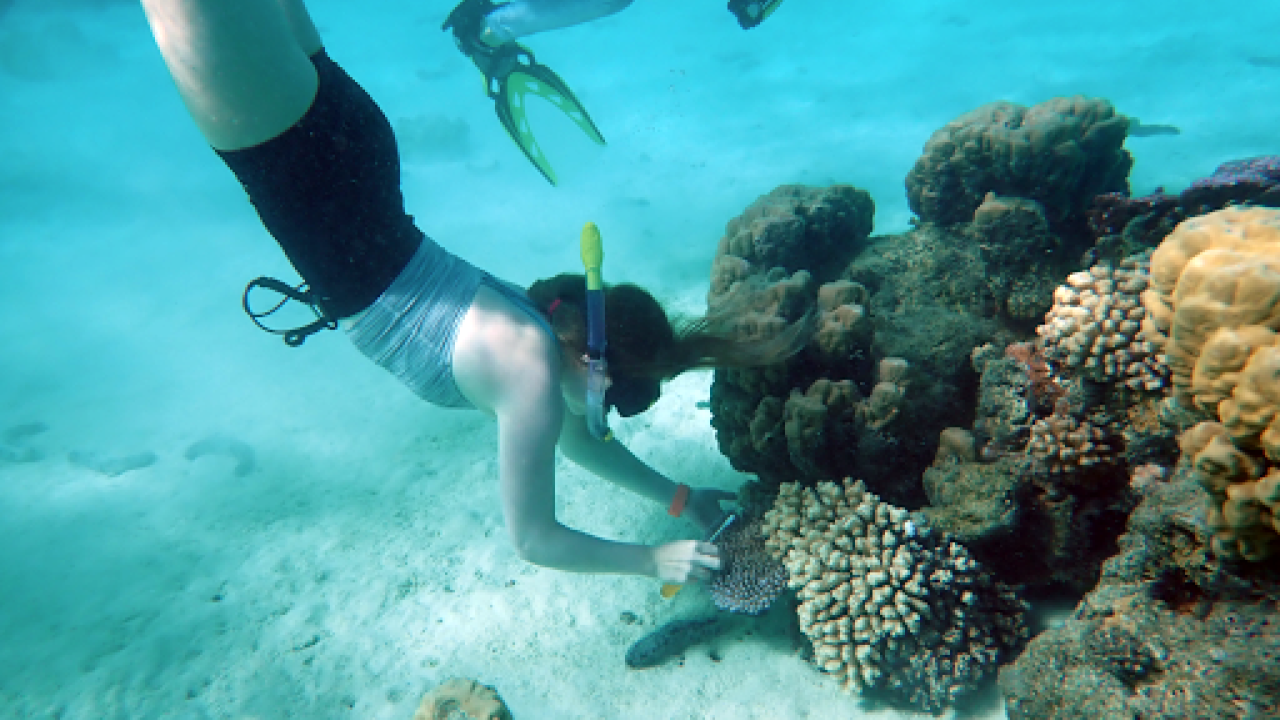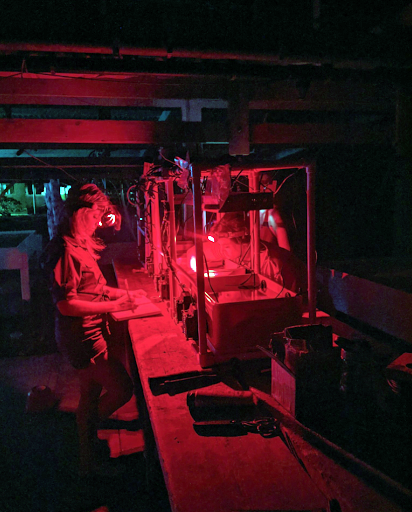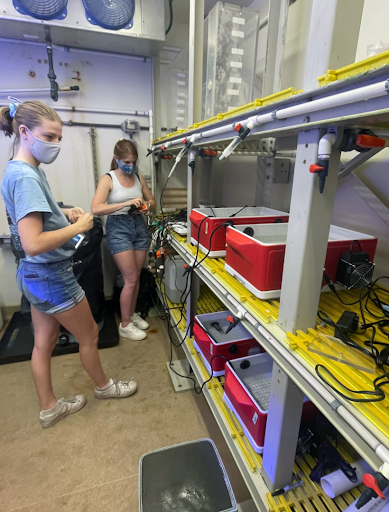
Spotlight On: Leslie Guerrero
Coral reefs are foundational and iconic ecosystems that have long captivated many with their vibrant colors, interesting ecology, and ecosystem productivity. However, these beautiful reefs are facing their biggest challenge yet: climate change. How can immobile marine organisms, such as corals, survive and thrive in waters that are steadily warming? Leslie Guerrero, a PhD student in the Bay Lab at UC Davis, is working tirelessly to answer these questions.
Academic Journey
Saving the coral reefs hasn’t always been Leslie’s plan; she initially began her academic journey by attending technical school with the goal of becoming a nurse, but quickly realized that it was not the right career path for her. She switched directions to attend community college in Florida to earn her Associate’s degree, then she transferred to UC Davis and earned her Bachelor’s degree in Genetics and Genomics.
Once at UC Davis, she fell in love with genetics and genomics; she found herself becoming intrigued by questions about how organisms respond to environmental cues through differential gene expression. Upon graduation, Leslie went on to become a junior specialist in the Starr Lab where she was able to test hypotheses about genes that are important for nuclear morphology in specific tissues, and genes that are important for movement and anchoring of the nucleus during development in roundworms. She discovered that she loved the process of research; being able to ask questions, the satisfaction in discovering answers to those questions, and then developing new questions from those novel findings. Armed with knowledge of genetic and genomic research techniques and a love for research, Leslie decided to attend grad school to study corals in the Bay Lab at UC Davis.
Why Coral Reefs?

Not only are coral reefs undeniably beautiful, they also provide habitat for a great diversity of marine life that are both ecologically and economically important. Although corals are equipped with unique traits to help them survive in difficult environments, such as the ability to host photosynthetic algae and harvest food from them, they are rapidly being exposed to entirely novel environments as a result of climate change that are challenging their existence. Climate change is not only causing oceans to become more acidic but also much warmer; and because corals cannot swim to cooler waters, they must quickly adapt to these new conditions in order to continue surviving and providing the same ecosystem benefits. Because the habitats that corals live in are becoming increasingly warmer, the ability to respond to differences in temperature and to tolerate higher temperatures, referred to as thermal tolerance, is an important trait for corals to have, and is the main focus of Leslie’s research.
Thermal Tolerance in Corals
Leslie and the rest of the Bay Lab are preparing to embark on a month-long research trip to a research station in French Polynesia to delve into the underlying genetic mechanisms of thermal tolerance in Acropora species of corals. Species of corals within the Acropora genus are closely related genetically, yet there is variability between species regarding their ability to tolerate high temperatures. Leslie seeks to uncover what molecular mechanisms could be causing this variability between Acropora species. She hypothesizes that, although thermal tolerance can be a plastic/variable trait, the species that have higher thermal tolerance will have a more fixed–or ‘finely-tuned’–heat-stress gene expression response when exposed to heat stress compared to species that do not have high thermal tolerance.

What is Gene Expression?
Although every cell in an organism contains the same DNA, cells can differentiate to look and function in very different ways than other cells in the organism. For example, a cell in the brain is physically much different and fulfills different functions than a liver cell might. These differences are caused by differences in gene expression; although all the cells have the same set of genes encoded in DNA, the genes are differentially expressed in the cell itself. One way that gene expression is controlled in mammals, like humans, is through the process of DNA methylation. DNA methylation refers to the addition of a little molecular tag made of carbon and hydrogens that, when attached to the DNA, changes how it is expressed. Although the process of DNA methylation is conserved in marine invertebrates such as corals, it may not play the same role that it does in humans. Leslie predicts that species-specific DNA methylation patterns may be an important mechanism for gene expression that allows some coral species to be more thermally tolerant than others. She will be testing this hypothesis in her upcoming experiments in French Polynesia.
Implications of This Work
Because climate change is creating such a novel environment for so many marine organisms, understanding which traits are important to adapt to these novel environments will allow us to create more robust predictive models of which species are more likely to survive, what genetic variants could be advantageous, and more. Leslie is optimistic that discovering which genes and processes are important in the evolution of ecologically relevant traits, such as thermal tolerance, in corals will be able to apply to many other sessile marine invertebrates. As the deleterious effects of climate change become more and more evident, it is more important than ever to understand the mechanisms behind organisms’ thermal tolerances and responses to other changing environmental conditions.
Advice to Undergraduates
“It’s okay to use your time in undergraduate to explore,” Leslie emphasizes. Although it may sometimes feel like there is a lot of pressure to know exactly what you want to do and what you want to study during undergraduate, there is a lot of discovery and exploration to be had during these years.
“If you’re at all interested in research, reach out to professors or graduate students! The community at UC Davis is so open and excited to teach people who are excited about learning; so as long as you’re excited about learning more, reach out! You will find an opportunity,” she encourages.
She also emphasizes how different the learning process is in research versus the standard “academic” way of learning; during the research process, you get to discover completely new information, which often leads to a greater sense of achievement when you reach your goals than when you reach your goals in a traditional educational setting.
“Something that is really cool and fascinating about genetics/genomics research is how translatable the research and the procedures are,” Leslie explains as she discusses why she enjoys her field of research so much. “Once you know the fundamentals, you will be able to answer so many different questions in a variety of systems.” Because all organisms have DNA, once you understand the research methods and concepts in the genomics realm, you can apply that knowledge to virtually any system and any set of questions.
Lastly, as a former transfer student herself, Leslie is very passionate about ensuring that transfer students have good research opportunities and take advantage of all the activities that UC Davis has to offer. Reach out to professors and graduate students about research opportunities, but also be sure to utilize the Internship and Career Center (ICC) to inform your academic and career endeavors.
Want to Learn More?
To keep up with Leslie’s research and to learn more about corals, genetics/genomics research, and thermal tolerance, be sure to check out the Bay Lab website (https://baylab.github.io/) and follow Leslie on Twitter (https://twitter.com/BiosciLeslie).
CMSI recently hosted a virtual event, “Coral, Climate Change, and Science Communication” with Dr. Craig Musburger and Leslie Guerrero, in conversation about Dr. Musburger's videography work and his role in the film Chasing Coral, about coral bleaching events around the world, and what we can do to spread knowledge about the pressure that warming, acidic waters are putting on the world's coral reefs.
Watch the event here:
Jenna Quan is a fourth-year undergraduate student majoring in evolution, ecology, and biodiversity and minoring in education. She has a passion for ecology and biology, especially in marine systems. Upon graduation, she hopes to pursue a PhD in ecology and continue on in academia. When Jenna is not working on research projects at BML or in a genetics lab, she is co-captaining the UC Davis Dance Team and working on her knitting projects!
